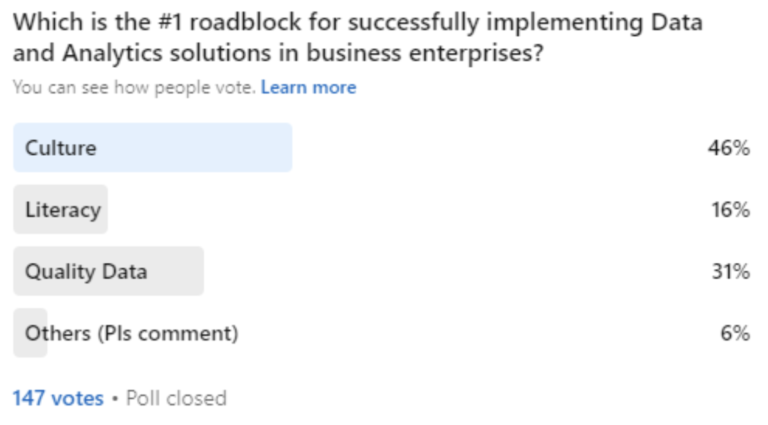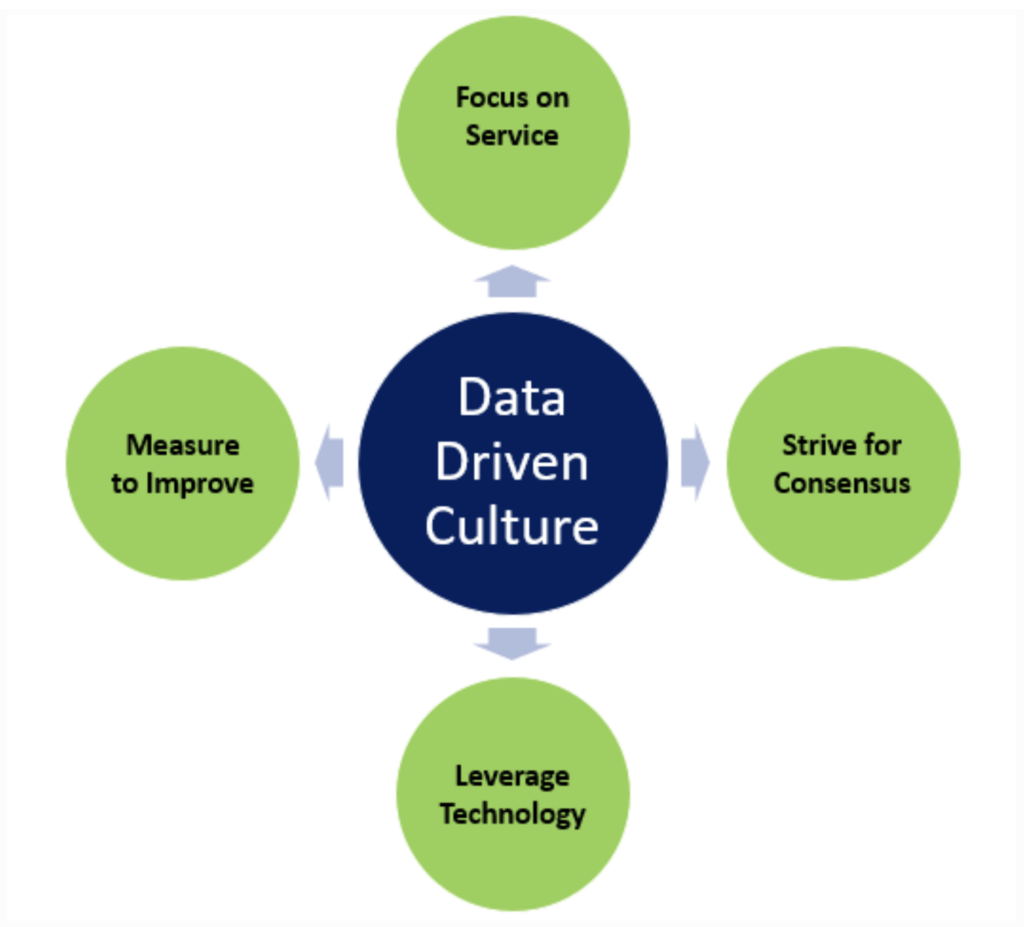
Deriving Business Value from Data and Analytics
Prashanth Southekal, PhD, MBA
Every company today is a data company as data is redefining business models and enabling new revenue streams, reducing costs, and mitigating business risks. Today, data is often an integral part of the business model in many companies. By 2023, IDC predicts that more than half of all GDP worldwide will be driven by products and services from digitally transformed enterprises[1]. A Mckinsey report says data and analytics provide increased EBITDA (Earnings Before Interest, Taxes, and Depreciation) of up to 25 percent[2], and a study conducted by Boston Consulting in 2022, found that the first 9 of the top 10 innovative companies in the world are data firms. Overall, data today is considered the key enabler of innovation and productivity in business.
But achieving a sustainable competitive advantage from data and analytics is very challenging and many data and analytics projects are not very successful. A report in VentureBeat says that 87 percent of data analytics projects never make it to production[3]. There are many reasons for this poor success rate. In this regard, I conducted a field research to determine the main roadblocks for successfully implementing Data and Analytics solutions in business enterprises. Over 147 industry practitioners across the globe took the survey and the three main reasons were found that prevented businesses from realizing value from data and analytics. The three reasons are: data culture, data quality, and data literacy[4].

The findings from his research align with the research from Harvard Business Review, which states that Data culture and Data literacy are the top reasons why companies have issues with getting business results from Data and analytics[5]. In this backdrop, this blog which is part of the series of three blog posts will discuss the drivers to realize business value from data and analytics. Specifically, this blog will look at the impact of data culture on data and analytics success, while the second blog will be on data quality and the third blog will discuss the impact of data literacy on data and analytics solution.
So, what is data culture in business enterprises? Data Culture is the collective behaviors and beliefs of people who value, practice, and encourage the use of data for improved performance in business operations, compliance and decision-making. According to Forrester, organizations that use data to derive insights for decision-making are almost three times more likely to achieve double-digit growth. A report from MIT found that a data-driven culture results in increased revenue, improved profitability and enhanced operating efficiencies[6]. Research from IDC shows that organizations realize the full value of their data when they have a data culture[1]. So, how can an organization build a strong data culture? While there are many strategies, below are four key enablers for business enterprises to build a data driven culture. The following section will discuss these four aspects in more detail.

1. Inculcate the service culture
Service culture is an outlook that focuses on consistently creating value and trust with the business stakeholders. But how does the service culture relate to data and analytics? To provide consistent service, there has to be a reliable frame of reference on the service levels, and this reliable frame of reference comes from data. Below are three key strategies to build a service culture in the organization.
- The service culture or rather the data-driven culture should start at the top where the C-suite makes decisions on growth, cost, and risks using data and not purely on intuition. This can be further bolstered by avoiding groupthink and being receptive to new ideas based on facts or data.
- Treat everyone who consumes the products or services in the company as a customer. At the same time, a customer doesn’t always have to be the one who pays for the product or services. A customer can also be an internal stakeholder who consumes your products and services.
- Build data literacy. A good level of data literacy empowers the organization to ask the right questions, acquire pertinent data, derive insights, validate assumptions, and make decisions, so as to serve the stakeholders objectively, ethically and efficiently. Data literacy will be covered in the third blog of this thought leadership series.
2. Focus on measurement
A consistent service depends on quality data to measure and improve its performance. At the core, data and analytics is about measurement because measurement creates visibility, and visibility drives business performance. Below are three key techniques associated with measurement to build a data-driven culture in the organization.
- Build a KPI measurement framework that encompasses both leading and lagging metrics on business performance. Research says that the number of KPIs “magic number” in the measurement framework should be 7 +/- 2. The Magical Number Seven experiment purports that the number of objects an average human can hold in working memory is 7 ± 2. This idea was put forward by Harvard psychologist George Miller (1956) and he called it the magic number 7 [Southekal, 2020].
- Formulate the baseline performance. The baseline performance is the current performance level that will be compared against future performance levels to validate and verify performance improvement.
- Find owners for the KPIs. The performance brings change and successful change initiatives rest on accountability or ownership for addressing the gaps between the expected and actual performance.
3. Emphasize consensus culture
A consensus-based culture relies on insights driven by data, unlike the hierarchical culture where the decision-making is based primarily on title, position, and seniority. Below are three strategies to build a consensus-based culture.
- Include the right subject matter experts (SME) in the decision-making process. Research by Bain Consulting found that the optimal number of SMEs to make a good decision is 7.
- Validate the decision to the objectives, question, KPIs, assumptions, ethics and payoff data by having the right feedback mechanisms. Also, ensure that the problem is framed correctly and the decision is arrived at with minimum bias.
- Realize performance improvements by breaking down the objectives into smaller tasks and setting milestones based on targets, control limits and specification limits.
4. Leverage technology
While technology alone might not be the driver or solution to realizing the data culture, it is a significant enabler. Successful business transformation programs have a strong correlation to technology due to the scale, speed and cost benefits technology offers. Below are three strategies to leverage technology to build the data culture.
- Capture critical data elements such as products, customers, assets and more in the System of Record (SoR) for a single version of the truth.
- Deploy predictive analytics solutions to be a proactive organization and better manage business resources and cash flow given that predictive analytics solutions have the highest impact on business results.
- Managing access to data for the right users with appropriate role-based access controls (RBAC) so that the data is secure and the organization can speak the same language of data.
Overall, without a strong data culture, organizations will miss opportunities to use the data for improved business results. But once the above four key building blocks of the data culture are in place, there will be a change in the mindset of the organization to value data and insights. This will further enable the successful deployment of data and analytics solutions based on the level of D&A maturity in the organization. However, data culture is one of the three key elements to build a strong data and analytics organization. The others two being data literacy and data quality. The second blog will discuss strategies to realize data quality and the third blog in this thought leadership series will look at improving the data literacy levels in the organization.
References
[1] IDC, “How data culture fuels business value in data-driven organizations”, May 2021
[2] Mckinsey and Company (Böringer, Jochen, Dierks, Alexander, Huber, Isabel, and Spillecke, Dennis), “Insights to impact: Creating and sustaining data-driven commercial growth”, https://www.mckinsey.com/capabilities/growth-marketing-and-sales/our-insights/insights-to-impact-creating-and-sustaining-data-driven-commercial-growth , January 2022
[3] VentureBeat, “Why do 87% of data science projects never make it into production?”, https://venturebeat.com/ai/why-do-87-of-data-science-projects-never-make-it-into-production/, 2019
[4] Southekal, Prashanth, “Analytics Best Practices”, Technics, 2017
[5] HBR1 (Davenport, Thomas and Bean, Randy), “Big Companies Are Embracing Analytics, But Most Still Don’t Have a Data-Driven Culture”, https://hbr.org/2018/02/big-companies-are-embracing-analytics-but-most-still-dont-have-a-data-driven-culture, Feb, 2017
[6] Brown, Sara, “How to build data literacy in your company”, https://mitsloan.mit.edu/ideas-made-to-matter/how-to-build-data-literacy-your-company, Feb, 2021
About the Author
Dr. Prashanth Southekal is a Consultant, Author, and Professor. He has consulted for over 80 organizations including P&G, GE, Shell, Apple, FedEx, and SAP. Dr. Southekal is the author of two books — “Data for Business Performance” and “Analytics Best Practices” — and writes regularly on data, analytics, and machine learning in Forbes and CFO.University. His second book, ANALYTICS BEST PRACTICES was ranked #1 analytics books of all time in May 2022 by BookAuthority. He serves on the Editorial Board of MIT CDOIQ Symposium, Advisory board member at BGV (Benhamou Global Ventures) a Silicon Valley-based (Menlo Park) venture capital firm, and a Data and Analytics Advisor at Evalueserve (CH), Grihasoft (IN), uArrow (SG), Astral Insights (US), and Miles Education (IN). Apart from his consulting and advisory pursuits, he has trained over 3,000 professionals worldwide in Data and Analytics. Dr. Southekal is also an Adjunct Professor of Data and Analytics at IE Business School (Madrid, Spain) and CDO Magazine included him in the top 75 global academic data leaders of 2022. He holds a Ph.D. from ESC Lille (FR) and an MBA from Kellogg School of Management (US). He lives between Calgary (CA), Madrid (ES), and San Francisco (US). Outside work, he loves juggling and cricket.




